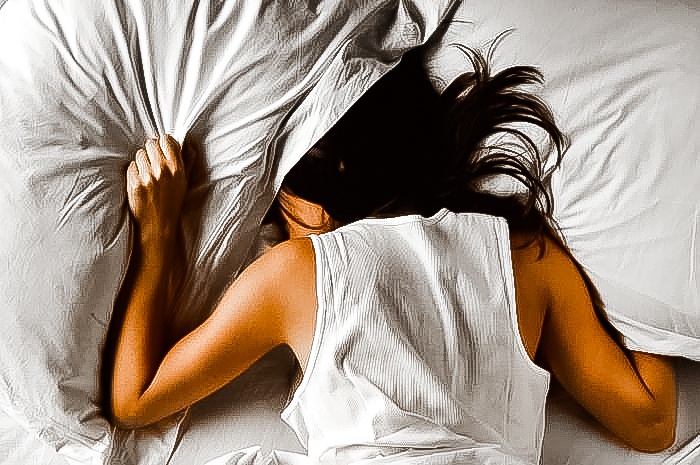Why You’re Not Getting A Good Night’s Sleep

Most people I know, especially women, don’t get the recommended 7 to 9 hours of sleep each night. They stay up too late and wake up to early. Most of the time it’s because they use the later hours to catch up on email, straightening up the house, watching tv, or having some much-needed quiet time. Then they wake up feeling unrested, using caffeine to get through the day. Is this you? While all of those things are contributing to your lack of sleep, studies have shown that you may be sleep-deprived for a few other good reasons. Here’s why you’re not getting a good night’s sleep…
- Because you expend more mental energy each day, you require about 20 more minutes of sleep than men do.
- You are more likely to wake up in the middle of the night to tend to your child’s needs.
- It’s hard for your mind to rest when its racing thinking about your to-do list and everything else on your plate.
- Your sleep-wake cycle is being affected by your hormones.
A few years ago, my daughter Journey was having trouble sleeping. So much so that we had to see a sleep psychologist and other sleep specialists. Even though you might not be able to control all of the above, here’s what they shared about why you’re not getting a good night’s sleep…
You’re missing your sleep window
Often times we fight our sleep because we feel like it’s too early to go to bed. We’ve all been there with one eye open and still won’t turn the tv off and just go to bed because we are grown and so we should stay up late. Then by the time you are ready to go to sleep, you’ve missed your window. Now you can’t fall asleep. Stop fighting it. When that sleepy, drowsy feeling hits you, go to bed.
You don’t have a regular bedtime
Setting a regular bedtime not only increases your quality of sleep, but it also has health benefits. Studies show that people who didn’t keep to a regular bedtime and wake time weighed more, had higher blood sugar, higher blood pressure and a higher risk of heart attack or stroke within 10 years.
You’re scrolling on your phone, working on your laptop, or watching tv
Computers, smartphones, televisions and tablets emit blue light, which can reset your circadian clock and make your body think that it is time to be awake. Put down all electronics at least 30 minutes before bed. Use that time to read, draw, journal, or get ready for the next day.
When you do wake up in the middle of the night, you pick up your phone or turn on the tv
If you wake up in the middle of the night do not pick up your phone or turn on the tv. And as much as you might be tempted, do not check the time! First, try to fall back to sleep naturally. Next, try to do some deep breathing or listen to a sleep story on an app like Calm or Amazon to help you relax. If you can’t get back to sleep within what feels like 30 minutes or so, get out of bed and move to a chair or comfortable space and do something boring like read, meditate, do a crossword or sudoku puzzle with a dim light until you feel sleepy, but not more than what feels like 30 minutes. The reason you should get out of bed is because it’s important that you associate your bed with sleep and comfort, not anxiety and stress.
It’s too warm in the room
I’m always freezing so I like it on the warmer side. But every time I leave the thermostat on a higher temperature, I wake up in the middle of the night sweaty and uncomfortable. That’s because a mild drop in body temperature induces sleep. The optimal temperature for sleep is between 65 and 72 degrees. For me, 70 degrees is my sweet spot.
You’re not comfortable
If you have trouble getting settled or staying asleep, it could be time for a better sleep makeover! A new mattress, comfortable pillows and a weighted blanket might be all you need to get a better night’s sleep.
You’re consuming alcohol too close to bedtime
Even though having a glass (or 2!) of wine can help you relax and fall asleep, the process of breaking it down has a stimulant effect that can keep you up. Limiting alcohol 4 hours before bedtime can minimize any disruption to sleep.
Your room is too loud or too bright
Your room should be dark, cool and quiet. If your bedtime clashes with others in your home, try earplugs to minimize noise. And a sleep mask will help block light if your room gets morning light from the sun or night light from streetlights, etc.
The sleep specialists also suggests taking melatonin at least 30 minutes before bedtime. It’s a hormone that your brain produces in response to darkness that helps your body know when it’s time to sleep and wake up.
If you try all of this with no success, consider visiting a sleep specialist to see how you can improve your sleep. You could have a common condition like sleep apnea or restless leg syndrome that is interrupting you REM sleep. You might also benefit from a sleep study to find out why you are having trouble sleeping.
Hopefully now you have a better grasp on why you’re not getting a good night’s sleep and what you can do to change it. Thankfully, Journey has been sleeping much better since implementing some of these tips and so have I.
